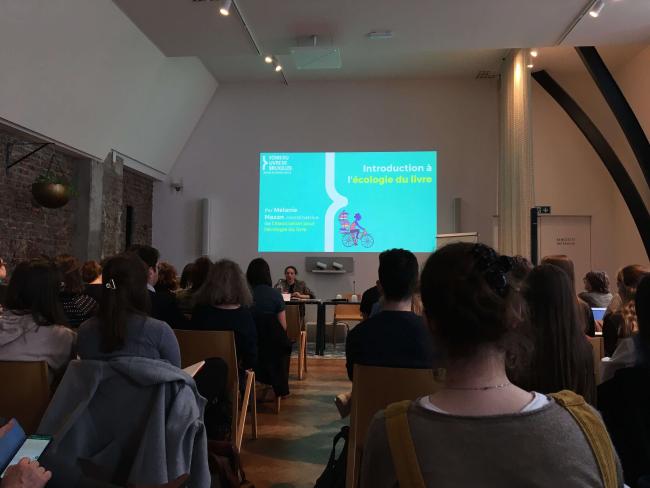
EIBF attended Brussels Book Fair’s first seminar on green issues in the book sector, called “the environmentally-conscious book”
On Thursday 30 March, a half-day seminar on the environmental and social sustainability of books and the book industry was held as part of the program of the Brussels Book Fair, which took place from March 30 to April 2, 2023. This first inter-professional seminar, organized by the Association pour l'écologie du livre (Association for the Sustainability of the Book), brought together speakers from across the sector to spark dialogue on environmental issues in the book sector.
This afternoon of panels, bringing together professionals from the trade, highlighted many environmental issues in the book sector, such as problems linked to overproduction, the second-hand book market, the theme of bibliodiversity, which is cultural diversity applied to the world of books, and also sustainability trainings in the book world.
This conference was introduced by Mélanie Mazan, coordinator of the Association pour l'écologie du livre, an association created in 2019 as a response to what it observed as a "disposable book economy", in which overproduction and excessive wastefulness reigned. With the goal of enhancing the book sector’s environmental responsibility, the Association pour l'écologie du livre now advocates a profound transformation of the book ecosystem through interprofessional collaboration, awareness-raising, and training for professionals.
The first panel covered the topics of overproduction, returns, recycling and pulping, and possible alternatives to remedy these problems, and was moderated by Laura de Heredia from L’Association pour l’écologie du livre. Laura opened the session by recounting figures collected from Syndicat National de l'Édition (the French Publisher’s Association), which states that between 2018 and 2022, 26 thousand tons of books were pulped each year. This soaring figure can be accounted for by several issues in publishing, such as the problems of faulty printing, the difficulty of estimating the quantity of print runs, but also the importance of the cost of storage, which inescapably influences the problem of returns and eventually books being pulped.
The panelists discussed many alternative solutions, including the possibility of pooling certain purchases for publishers, meaning that they would work with one common printer. Furthermore, an interesting idea to avoid pulping damaged books would be to print additional covers separately and replace only the damaged covers in order to be able to sell the books in new condition. Additionally, the possibility of donating unsold books to NGOs or other aid organizations was raised as another alternative to bring down the number of pulped books. This would only be possible with the author’s agreement and provided that the respective organization does not resell the books. The speakers finally agreed on the pivotal necessity to apply a long-term perspective, by reviewing the supply chain to move away from the economy of scales.
The conference then continued with a presentation on the relevance of selling used books by French sociologist Vincent Chabault, who conducted a long-term study on this subject in his book Le livre d'occasion : Sociologie d'un commerce en transition. The benefits of second-hand books, such as the fact that they extend the life of a book, were discussed during this round table. For example, Chabult highlighted the disadvantages of this new market, mentioning the carbon footprint of individualized delivery, the potential tendency to accelerate consumption.
The topic of bibliodiversity was also broached and the importance of diversity and sustainability in the book sector was emphasized. Moreover, the need to value the contribution of smaller voices of the sector was highlighted, as for example Belgian francophone publishing houses in relation to bigger French publishers, and the diversity they bring to the trade by introducing new perspectives and stories.
Finally, the afternoon ended with a panel on trainings on sustainability issues in the book industry. It focused on how you can train young people in the sustainability issues in the book world and on the need to offer continuous trainings for the already established actors in the book supply chain.
Overall, this first conference on the theme of book ecology allowed for discussions around fundamental issues to review the ecosystem in the book industry. Professionals in the field were able to discuss the problems they face while also sharing potential solutions. During this enlightening afternoon, we were reminded of the fact that our sector is indeed facing many difficult challenges now and in the years to come as we move towards a greener path. However, we were also reminded that the will and determination that is necessary for the industry to become both socially and environmentally sustainable can already be found on all levels of the book supply chain, and there are many ways in which we can move forward together.
